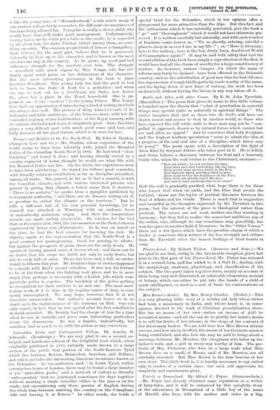Battle and After, with other Verses. By R. St. John
Tyrwhitt. (Macmillan.)—The poem that gives its name to this little volume is founded upon the theory that "a law of gravitation in material things may operate quite as naturally in spiritual things." The writer imagines that just as those who do God's will here are drawn nearer and nearer to God in another world, so those who have opposed His will while unfit to draw near may yet be "com- pelled to approach, drawn as by natural forces which cannot but act and allow no appeal." And he considers that both Scripture and the highest heathen speculation "seem to admit the idea of a progress of the soul and also of a discipline, which latter may be penal." The poem opens with a description of the fight of Abou Klea by Serjeant Atkins, who takes part in it. He is killed, and there follows a discourse between his Soul and a heavenly Guide who, when the soul wishes to rise Christward, exclaims :— "Rest yet awhile, 'tis not yet time for thee, Since thou hest died hard-biting, like thy race, Thou needst must unlearn battle in the flesh Now thou art Spirit, and thou shalt be pure; Made clean to bear the brightness of this Face. Thou didst not utterly reject His love, And now it shall constrain thee to be clean."
How the soul is gradually purified, what hope there is for those who forgot God when on earth, and the bliss that awaits the faithful,—these are the topics of poetical discourse between the Soul of Atkins and his Guide. There is much that is suggestive and beautiful in the thoughts expressed by Mr. Tyrwhitt in this poem ; but the interest of the piece is theological rather than poetical. The verses are not weak, neither are they wanting in harmony ; but they fail to realise the somewhat ambitious aim of the writer, who, although he can sometimes sing gracefully, has won his spurs in another field of literature. In the "Other Verses," there are a few lyrics which have the peculiar charm of which a reader is conscious when writers of far less strength and culture than Mr. Tyrwhitt utter the inmost feelings of their hearts in song.


















































 Previous page
Previous page